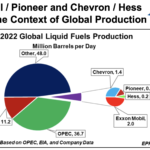Energy News Beat
Key Takeaways
Exxon has proposed buying Pioneer Natural Resources and Chevron has proposed buying Hess.
If the mergers succeed, Exxon and Hess will represent about 4.2 percent of the world oil market.
Some Senate Democrats have asked the Federal Trade Commission to probe the deals for possible antitrust actions.
Because of synergies in operations and economies of scale, the mergers would benefit the U.S. economy and national security interests, U.S. consumers, and global carbon dioxide emissions.
Oil and gas are less likely to be effectively used as weapons for economic and national security purposes by OPEC+ and others when the United States is the largest producer of these fuels.
In October, Exxon proposed buying Pioneer Natural Resources for $60 billion and Chevron agreed to acquire Hess for $53 billion. If the Exxon/Pioneer and the Chevron/Hess oil company mergers are approved by regulators, the companies would control just 4.2 million barrels per day in a global market of over 100 million barrels per day. In other words, the oil company mergers would only impact 4.2 percent of the global liquids market. By comparison, OPEC and Russia control over 47 percent of total global liquid fuels production, and in recent years, OPEC+ has been able to limit the availability of that oil to elevate prices. Further, the United States has roughly 9,000 small independent oil producers that produce 83 percent of total U.S. oil production and 90 percent of total U.S. natural gas production. In Texas, there were more than 5,700 oil and gas producers operating in 2022. Yet, Senate Majority Leader Chuck Schumer and 22 other Senate Democrats requested the Federal Trade Commission (FTC) to launch antitrust probes, alleging that multi-billion-dollar acquisitions by Exxon Mobil and Chevron would lead to reduced competition and higher prices for consumers.
Source: Energy Policy Research Foundation
The FTC is now reviewing both pending mergers to determine whether the mergers could be anticompetitive under U.S. law. The FTC, which shares antitrust authority with the Justice Department, can sue in court to block a merger if it believes it is anticompetitive. On December 4, 2023, Pioneer and ExxonMobil each received a request from the Federal Trade Commission for additional information related to its review of the proposed merger transaction announced on October 11, 2023. That was followed by an FTC request for similar information from Chevron and Hess. While the investigation could take several months, Pioneer expects that its transaction will be completed by mid-2024.
Agencies with antitrust authority have rarely taken action against oil-and-gas producers, mainly because they compete in a global market and there is enormous competition. Some oil executives and deal makers had anticipated a recent series of acquisitions would draw antitrust scrutiny, but they see little chance the FTC would prevail in court if it pursued legal action. Under the Biden administration, the commission has become more active in taking action against large mergers, challenging 11 deals in court. Five deals were canceled after the FTC filed lawsuits to block them. But the commission has lost some antitrust court challenges against large companies such as Microsoft when a judge allowed it to purchase Activision Blizzard for $75 billion.
The Mergers Would Benefit Americans
Rather than increase prices for consumers as Schumer suggests, the proposed deals would enhance U.S. energy security and benefit the American economy and consumers. By allowing the major oil producers to increase their presence in U.S. shale oil plays, the deals create opportunities to bring significant new supplies to market. According to ExxonMobil, its purchase of Pioneer would raise its reserves in the Permian basin to 16 billion barrels of oil equivalent. The merger combines Pioneer’s 850,000 net acres in the Midland Basin with ExxonMobil’s 570,000 net acres in the Delaware and Midland Basins, securing Exxon’s status as the largest player in the hydraulic fracturing/horizontal drilling industry.
And, Chevron’s purchase of Hess would make the oil major a partner in an Exxon-led consortium developing a generational oil find in Guyana, where Hess has a 30 percent stake. (The Chinese National Offshore Oil Corporation (CNOOC) owns the remaining 25 percent.) Chevron would also acquire assets in North Dakota’s Bakken Shale, where Hess is one of dozens of operators. Before Chevron and Hess agreed on the deal, Hess had more than $15 billion in net operating losses from previous years and was unable to take advantage of them due to low profits and heavy losses. This is indicative of the “rough-and-tumble” nature of the oil and gas business where politicians attack profits but ignore the sizable losses companies experience.
ExxonMobil chief executive Darren Woods asserted, “This acquisition is a win any way you look at it. By combining the capabilities of our two companies, we expect to recover more resource, more efficiently, with better environmental performance, including the acceleration of Pioneer’s net-zero Permian ambition from 2050 to 2035.” ExxonMobil has the resources to get more out of the ground and do it at vastly improved emissions levels. According to Exxon, the merger would streamline the resources of the two companies while expecting a cost of supply of less than $35 per barrel from Pioneer’s assets. Chevron, in its proposed deal with Hess would strengthen long-term performance while “delivering higher returns and lower carbon” dioxide emissions.
These mergers are not unusual given the state of the oil market. Rising interest rates caused by Biden’s inflation have increased the cost of capital, making it more expensive for oil producers, who face massive capital outlays for exploration and development and to drill for new wells, making mergers more attractive. Oil companies need to be vigilant regarding Biden’s anti-oil and gas policies because they run the risk of investing in new oil and gas operations and infrastructure that might be made uneconomic if Biden’s net zero carbon program is fully implemented. These factors are compounded by the antagonistic regulatory environment that President Biden and his administration have promoted since his taking office that has caused U.S. gasoline prices to increase. During the Trump administration, gasoline prices were low due to Trump’s energy dominance program.
U.S. oil production and exports work to lower oil prices and ease OPEC’s dominance of global oil markets, which was strong until the U.S. shale oil renaissance took off in the early 2000s and unlocked previously inaccessible reserves of oil and gas. Many of these shale oil resources were in areas with a history of oil exploration believed to be “played out.” That belief was proved wrong by technology and investment, resulting in U.S. oil production 105 percent higher in 2022 than in 2000. With the acquisition of Pioneer, Exxon’s Permian Basin production would more than double to 1.3 million barrels of oil, helping to lower prices and strengthen America’s energy security. And since the United States creates energy with a higher environmental protection score than virtually every other country in the world, allowing these American companies to combine will hasten the U.S.’s outstanding record.
In 2024, the United States is expected to produce more oil than any country in history, leading strong non-OPEC+ supply growth that exceeds rising global demand. Fourth-quarter 2023 U.S. total liquids production is expected at 21.4 million barrels per day, of which 13.3 million barrels per day is crude and condensate with the remainder composed of natural gas liquids and biofuels. Both totals are global records.
Conclusion
The Exxon/Pioneer and Chevron/Hess mergers would be a plus for U.S. energy security, the U.S. economy and American pocketbooks as greater American production helps keep OPEC+ dominance from raising oil prices significantly due to its control of the market and vast oil reserves. Saudi Arabia and Russia are voluntarily cutting output in order to keep oil prices in a range that benefits their economies. Without U.S. production, they would be able to raise prices indiscriminately. Since Bidenomics and Biden’s anti-fossil fuel policies are restricting lease sales and making oil companies leery of huge investments into new drilling, mergers are a way to keep U.S. production up, and oil prices from escalating. These mergers represent only about 4 percent of the global oil market, which is not enough to dominate the market as Schumer suggests.
Tags
The post Global Oil Production and Pending Oil Company Mergers appeared first on Energy News Beat.








